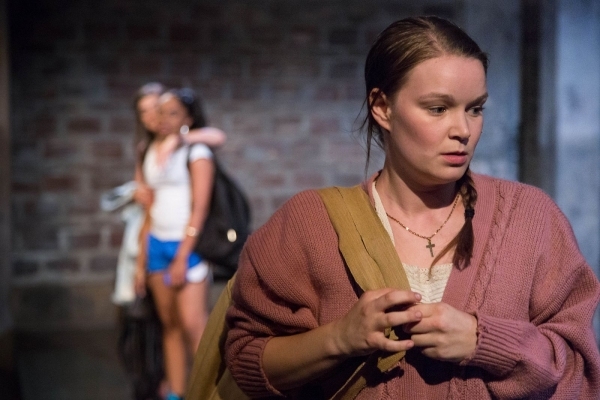Carrie — The Musical

(© Igor Dmitry)
Few musicals have caused as much controversy as Carrie, the stage adaptation of Stephen King's novel of the same name. In its various incarnations on Broadway, off-Broadway, and around the country, audiences are polarized by this musical adaptation of Stephen King's novel, finding it brilliant social commentary or featherweight camp.
Now Studio Theatre codirectors Keith Alan Baker and Jacob Janssen are trying their hand at the show. The pair has found the right balance of horror and social commentary. Their first contribution to the musical is to keep it moving briskly, so that its disparate elements clash, jolt, and create sparks at a dizzying pace, causing a sense of constant tension and vibrancy. Their second contribution strips the musical of visual distractions, utilizing Luciana Stecconi's brilliantly minimal set of a few benches and chairs to represent the school and Carrie's home. Sarah Tunderman's projections of lockers help focus the action in the school gym.
The musical opens with shy Carrie White (Emily Zickler), a lonely high schooler with normal teenage angst aggravated by other kids who shamelessly bully her. Carrie's overprotective mother, Margaret (Barbara Walsh), is a religious zealot, whose fanaticism grows through the musical, creating another cross for Carrie to bear. The only thing that saves Carrie is the realization that she has a special power: telekinesis. At the end of the show, when Carrie can stand her situation no longer, she uses her power to exact revenge on her bullying classmates .
Book writer Lawrence D. Cohen does not stray far from the original story, providing an image of a sensitive young girl tortured by mean-spirited teenagers. Cohen frames the story by having one of Carrie's friends, Sue Snell, tell an offscreen interrogator what happened at the prom. Michael Gore's music offers a nice but forgettable blend of pop and rock and a near-operatic aria for Margaret White's exposition of her belief in Christian salvation. Dean Pitchford's uneven lyrics are better when they employ near rhymes rather than obvious ones.
Zickler is convincing and charming as the soft-spoken girl who can belt out her most passionate hopes and fears. She has a warm voice that allows her to convey her innermost feelings with power and gentleness. This is a Carrie who cries out for sympathy. Walsh is marvelous as Margaret White, conveying the image of a frail, fragile woman made of steel, a woman consumed with regret and anger. Her duets with Zickler are high points. Sue Snell is portrayed well by Maria Rizzo. Sue's boyfriend, Tommy, played by Robert Mueller, proves to be one of the strongest members of the cast, particularly when he sings with Carrie.
Jamie Eacker is excellent as Miss Gardner, the gym teacher who befriends Carrie. Eben K. Logan makes a standout Chris, the tough girl who is determined to make life as uncomfortable as possible for Carrie. Logan is particularly stunning in her "The World According to Chris," while A.J. Melendez is equally fine as Chris' nasty boyfriend, Billy.
The choreography, by Michael J. Bobbitt, is particularly good in the scenes where the chorus of high school students can let fly and dance. The chorus members are excellent dancers and create a sensational prom.
Whereas Carrie the novel could spin the story out slowly in a long narrative arc, the musical only has two hours to accomplish this task. And while it may be impossible to do justice to King's Carrie in such a short period, the Studio Theatre has come as close as Carrie fans may ever get.











